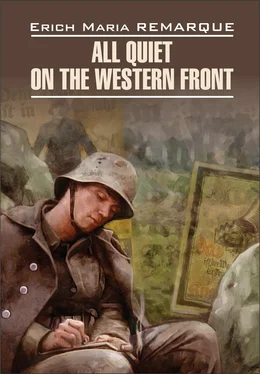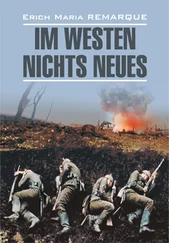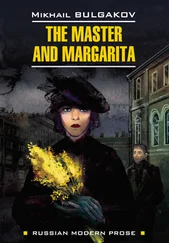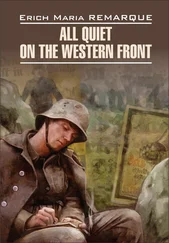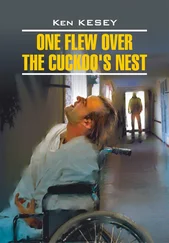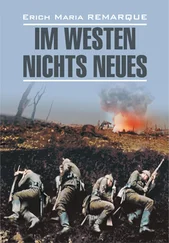We make sure that they can hear the malicious buzz of the little ones that you barely notice – they have to learn to recognize a sound like the buzzing of flies amongst all the noise. We teach them that these are much more dangerous than the big ones that you can hear long before. We show them how to hide from airmen, how to play dead when they are overtaken by an attack, how to prime a hand-grenade so that it explodes half a second before impact. We teach them to dive for cover as fast as they can into a shell hole when they see a shell with an instantaneous fuse, and we demonstrate for them how to clean out a whole trench with a handful of grenades. We teach them the difference in the detonation time between enemy hand-grenades and ours, make sure they know what a gas shell sounds like, and show them all the tricks that might just save them from being killed.
They listen obediently – but when it all starts they are usually so worked up that they get it wrong again after all.
Haie Westhus is carried off with his back torn open; you can see the lung throbbing through the wound with every breath he takes. I manage to take his hand – ‘That’s me done for, Paul,’ he groans, and bites his arm because of the pain.
We see men go on living with the top of their skulls missing; we see soldiers go on running when both their feet have been shot away – they stumble on their splintering stumps to the next shell hole. One lance-corporal crawls for a full half-mile on his hands, dragging his legs behind him, with both knees shattered. Another man makes it to a dressing station with his guts spilling out over his hands as he holds them in. We see soldiers with their mouths missing, with their lower jaws missing, with their faces missing; we find someone who has gripped the main artery in his arm between his teeth for two hours so that he doesn’t bleed to death. The sun goes down, night falls, the shells whistle, life comes to an end.
The scrap of churned-up earth where we are has been held against superior forces, and we have only had to give up a few hundred yards. But for every one of those yards there is a dead man.
Relief troops take over from us. The truck wheels roll along beneath us, we stand numbed, and when they shout, ‘Mind the wire!’ we bob down. It was summer when we came past here, the trees were still green, but now they have begun to look autumnal, and the night is grey and damp. The trucks stop. We climb down, a ragged bunch, all that there is left of a whole list of names. In the dark to either side of us there are people calling out the numbers of regiments and companies. And with every shout a little handful moves away from the rest, a sparse, tiny handful of dirty, pallid soldiers, a terribly small handful, a terribly small remainder.
Then someone shouts out the number of our company – we can hear that it is our company commander, so he must have made it; his arm is in a sling. We move towards him and I pick out Kat and Albert, we join together, prop each other up and look at each other.
And we hear our number called again, and then again. He can go on calling, but they won’t hear him in the clearing stations or out in no man’s land.
Again: ‘B company over here!’
And then more quietly: ‘Nobody else from В Company?’
He is silent, and then his voice sounds hoarse when he asks, ‘Is that all?’ Then he gives the command: ‘Number off!’
It is a grey morning. It was still summer when we went up the line and there were a hundred and fifty of us. Now we are shivering. It is autumn, the leaves rustle, the voices are tired as they call out: ‘One – two – three – four —’ and they are silent after thirty-two. And there is a long silence before the voice asks, ‘Any more?’ – and waits a bit and then says quietly, ‘By squads…’ but then breaks down, and can only finish the command with, ‘B Company painfully, – ‘B Company – march at ease.’
A line, a short line, stumbles off into the morning.
Thirty-two men.
They take us back further behind the line than usual, back to an infantry base depot [170] infantry base depot – полевой сборно-учебный лагерь
, so that they can get our company up to strength. We need more than a hundred men.
For the moment we just idle around when we are off duty. After a couple of days Himmelstoss comes over to talk to us. He has changed his high and mighty attitude since being in the trenches. He suggests a truce with us, and I am willing, because I saw how he carried Haie Westhus out of the fighting when his back had been ripped apart. Besides, now that he talks to us sensibly, we have no objections to him standing us a drink in the canteen. Only Tjaden is suspicious and keeps his distance.
But even he is won over when Himmelstoss tells us that he’s going to be standing in for the ginger-headed cook, who’s off on leave. To prove it he comes up with two pounds of sugar for us and half a pound of butter just for Tjaden. He even arranges for us to be detailed to the kitchens for the next three days to peel potatoes and turnips. The food he gives us there is one hundred per cent officers’ mess quality.
So at the moment we’ve got the two things any soldier needs to keep him happy: good food and rest. It isn’t much, when you think about it. A few years ago we would really have despised ourselves. Now we are pretty well content. You can get used to anything – even being in the trenches.
This habit of getting used to things is the reason that we seem to forget so quickly. The day before yesterday we were still under fire, today we are fooling about, seeing what we can scrounge around here, tomorrow we’ll be back in the trenches. In fact we don’t really forget anything. All the time we are out here the days at the front sink into us like stones the moment they are over, because they are too much for us to think about right away. If we even tried, they would kill us. Because one thing has become clear to me: you can cope with all the horror as long as you simply duck thinking about it – but it will kill you if you try to come to terms with it.
In the same way that we turn into animals when we go up the line, because it is the only way we can survive, when we are back behind the lines we become superficial jokers and idlers. We can’t do anything about it – it’s compulsive. We want to go on living at any price, and therefore we can’t burden ourselves with emotions that might be all very nice to have in peacetime, but are out of place here. Kemmerich is dead, Haie Westhus is dying, there’ll be a few problems with Hans Kramer’s body on Judgement Day [171] Judgement Day (религ.) – Страшный суд, Судный день
when they try to resurrect what was left after the shell hit him, Martens lost both legs, Meyer is dead, Marks is dead, Beyer is dead, Hammerling is dead, a hundred and twenty men are lying out there somewhere with a bullet in them. It’s all a bloody business, but what’s that got to do with us – we’re alive. If it were possible to save them – well, then you should just watch us, we wouldn’t care if we got it ourselves, we’d just go at it, because we’ve got plenty of guts [172] got guts (разг.) – иметь мужество (досл. иметь кишки)
when we need them; we don’t have much in the way of ordinary fear – we’re afraid of death, of course, but that’s different, that’s physical.
But our mates are dead, and we can’t help them. They are at peace – who knows what we might still have to face? We want to chuck ourselves down and sleep, or stuff as much food into our bellies as we can, and booze and smoke, so that the passing hours aren’t so empty. Life is short.
Читать дальше
Конец ознакомительного отрывка
Купить книгу
